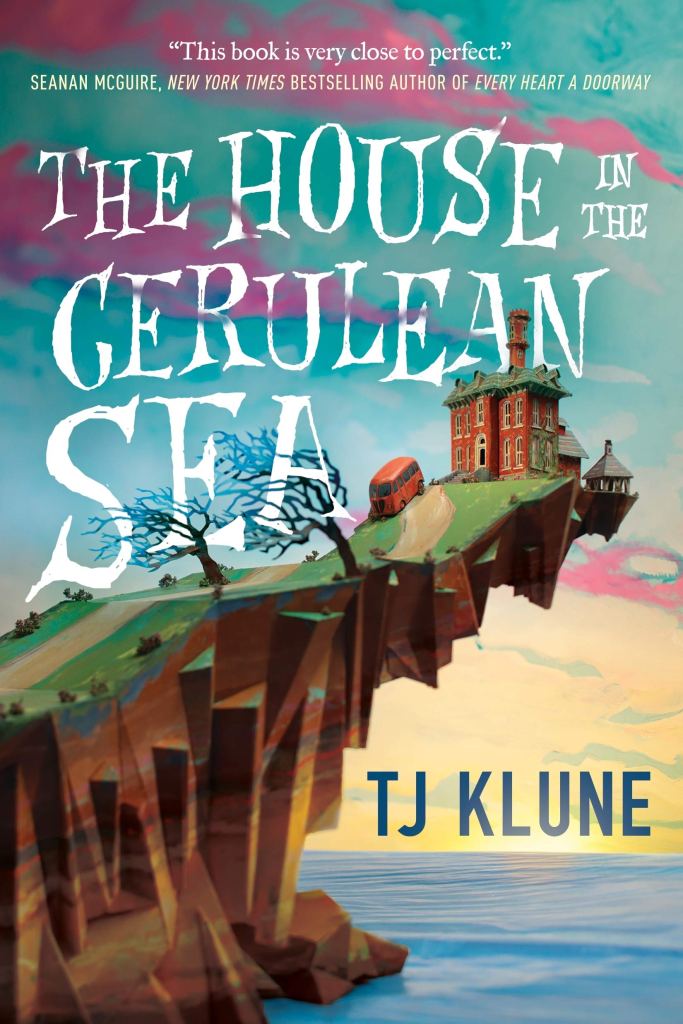
“Hate is loud, but I think you’ll learn it’s because it’s only a few people shouting, desperate to be heard. You might not ever be able to change their minds, but so long as your remember you’re not alone, you will overcome.”
You know what it is like where there is a book that you spot recurring on Twitter, Bookstagram, on Top Ten Tuesdays and which, when you pick it up, you feel distinctly “m’eh” about? Books you wonder what all the fuss about?
This is not one of those.
This is a wonderful, warm optimistic book about the optimism and resilience of children, about found families, about love and about overcoming prejudice – with a deftness of touch that is gorgeous.
The premise puts the novel into the fantasy realm: we are in an alternate Earth in which magical creatures exist alongside humans – subject to various registration rules and restrictions and viewed with a mixture of fear and suspicion and distrust. It is a familiar enough metaphor for othering and prejudice, whether based on race, gender or sexuality, but handled well enough. Those posters warning
SEE SOMETHING, SAY SOMETHING, the sign on the bus had read. And everywhere, really, wasn’t it? More and more lately. On buses. In newspapers. Billboards. Radio ads. Why, he’d even seen the words printed on a grocery bag of all places.
The world felt distinctly British – despite Klune’s American nationality – with its rain and buses, the forced formality of the Mr and Miss forms of address even in increasingly close and intimate relationships that make the invitation to use first names so significant, Linus’ tendency to refer to himself as “old boy”. And the bureaucracy.
And oh I did love the bureaucracy! The descriptions of the Department in Charge of Magical Youth with its reports and files policed by the fearsome Ms Jenkins “a stern woman, hair pulled back so severely that it brought her unibrow up to the middle of her forehead” and her assistant Gunther “a despicable toad of a man, carrying a clipboard and an obscenely long pencil he used to keep tally of those who appeared to be slacking on the job”. And of course the Extremely Upper Management, four autocrats who reside on the mythical Fifth Floor! There are echoes here of Yes Minister, The Fall and Rise of Reginald Perrin.
And of course our hero, the mild mannered and anxious DICOMY case worker Linus, is summoned to that mysterious Fifth Floor and tasked with reporting on an orphanage for magical youths on the island of Marsyas. It is deemed a formidable task and we discover that the orphans include
- Phee, a powerful forest sprite capable of coaxing life from the earth
- Talia, a gnome keen to use your body as fertiliser for the garden
- Sal, a shapeshifter who shifts into the form of a Pomeranian dog when scared and who writes poetry
- Theodore, a wyvern who collects buttons
- Chauncey, “an amorphous green blob with bright red lips. And black teeth. And eyes on stalks that stuck high above his head” who wants desperately to be a bell-hop (a very American concept which jarred a little with the world created)
- Lucy, the antichrist and destroyer of worlds, who is also just a mischievous six year old child born into a place no child should have had to endure.
And caring for the children is the luminous Arthur Parnassus, holding his own secrets and pains, and Ms Chapelwhite.
Part of the novel explores what it means to be a parent and the conflict between DICOMY’s rules and regulations for the upbringing of children, and Arthur’s giving children time and space to grow in autonomy and responsibility and adventures! Part of it explores the conflict between the orphans on the island and the town on the mainland and the micro- (and increasingly macro-) aggressions that the children are subjected to.
At its heart, however, this novel is about the joy and magic and wonder of being part of a family, the joy of loving and realising that you are worth receiving love – whether that be the familial love that the children offer Linus or the romantic love Arthur offers. In this way, it reminded me a lot of Becky Chambers’ The Long Way To A Small Angry Planet.
It would be hard to select a favourite moment in the novel – there are so many, particularly Linus’ first chaotic whirlwind of a dinner with all the children – but I did love Phee’s flower growing moment
Phee’s wings began to flutter rapidly, light refracting off them in little rainbows. She pushed her hands into the soil until they were covered completely. Sweat dripped from the tip of her nose onto the ground. Her brow furrowed. She sighed as she pulled her hands from the ground.
Linus was speechless when a green stalk grew from the earth. Leaves unfurled, long and thin. The stalk swayed back and forth underneath Phee’s palms, her fingers twitching. He was stunned when a yellow flower bloomed, the petals bright. It grew a few more inches before Phee lowered her hands.
“How did you do it?” he asked, the petal still between his fingers.
She shrugged. “I listened to the earth. It sings. Most people don’t realize that. You have to listen for it with all your might. Some will never hear it, no matter how hard they try. But I can hear it as well as I can hear you. It sang to me, and I promised it in return that I would care for it if it should give me what I asked for.”
And the wonderful way he undercuts the magic with Phee’s innocent childlike observation, once she told Linus that she named it after him that “Linus” is “‘a perfect name for it,’ she continued. ‘It’s a little flimsy, and honestly isn’t much to look at and will probably die if someone doesn’t take care of it regularly.’
The novel could have easily become cloying and overly cute and sentimental but Klune’s ear for that childlike barb was delightful and there was just enough edge and pain in the novel to balance it perfectly.
For a year that has been a challenge, this was like being enveloped in a warm hug!
Again, a David Mitchell book is an event, and a thing of beauty! But the music industry is not my natural setting and again I was caught between this and another book – Daisy Jones and the Six in this case – and Daisy Jones was read first. This time, because it was nominated on a book club I was part of.
Bonus: The Lies of Locke Lamora, Scott Lynch

They say that the Thorn of Camorr can beat anyone in a fight. They say he steals from the rich and gives to the poor. They say he’s part man, part myth, and mostly street-corner rumor. And they are wrong on every count.
Only averagely tall, slender, and god-awful with a sword, Locke Lamora is the fabled Thorn, and the greatest weapons at his disposal are his wit and cunning. He steals from the rich – they’re the only ones worth stealing from – but the poor can go steal for themselves. What Locke cons, wheedles and tricks into his possession is strictly for him and his band of fellow con-artists and thieves: the Gentleman Bastards.
This one has been on my TBR for years. Literally years. I have heard nothing but praise for it, but so far have never quite got around to reading it! Go figure!
So, there we go: a range of books that I got in 2020 – save for the Scott Lynch – and do regret not reading during the year. Is regret the right word? Probably not to be honest: I do not regret the reading that I did do last year at all. But these are books that I would like to find time to catch up with this year – before prize season hits us again!
Pop in the comments below your thoughts on these – maybe let me know which I should read first!

RATINGS:
Overall:
Characters:
Plot / Pace:
Worldbuilding:
Structure:
Language:
Page Count: 400
Publisher: Tor Books
Date: 1st April 2020
Available: Amazon



[…] The House In The Cerulean Sea, TJ Klune […]
LikeLike
All right, all right, I am putting it on my TBR pile! 😊
LikeLiked by 1 person
My tbr pile is mountainous!!
LikeLiked by 1 person
I was down to a little over 100 owned books, but it grew again to over 200. I am not even counting the ones I want to read, but don‘t own.
LikeLiked by 1 person
I’ve seen so many good reviews about this book – adding to the TBR!
LikeLiked by 1 person
This was such an amazing read for this year, it was so full of hope and warmth! Great review!
LikeLike
It was wasn’t it…. in a different year it MIGHT not have made the list but it was a book we needed for 2020!
LikeLiked by 1 person
I totally agree!
LikeLiked by 1 person
[…] ones I did. My favourite? I am caught between two: Red, White and Royal Blue by Casey McQuiston and The House in the Cerulean Sea by T. J. […]
LikeLike
[…] The House in the Cerulean Sea […]
LikeLike
[…] Baker and Arthur Parnassus, The House in the Cerulean Sea, T. J. […]
LikeLike
[…] The House in the Cerulean Sea, T. J. Klune […]
LikeLike
[…] is beautiful and shows “the joy of loving and realising that you are worth receiving love.” (Book Lovers’ Sanctuary) His review highlights his favorite parts of the book and how it affected him. The recurring themes […]
LikeLike
[…] The House in the Cerulean Sea, T. J. Klune […]
LikeLike
[…] Parnassus, The House in the Cerulean Sea by T. J. […]
LikeLike
[…] The House in the Cerulean Sea, T J Klune […]
LikeLike
[…] deliciously tender and sweet novel from T. J. Klune, author of The House In The Cerulean Sea, with many of the same pleasures – a remote and wonderfully Edenic setting, a found family, a […]
LikeLike
[…] 2020 as my mind was reaching for that comfort. Whether it is an orphanage for magical children in The House In The Cerulean Sea or the afterlife in Under the Whispering Door, Klune’s novels are tender, charming and flow […]
LikeLike
[…] the romance genre and I found that I loved the soft warmth of it. The Bookish Life of Nina Hill, T J Klune, Red, White and Royal […]
LikeLike
[…] The House in the Cerulean Sea, T. J. Klune – Linus and Arthur […]
LikeLike
[…] The House in the Cerulean Sea, T. J. Klune […]
LikeLike
[…] Linus and Arthur, The House in the Cerulean Sea […]
LikeLike
[…] The House in the Cerulean Sea, T. J. Klune […]
LikeLike
[…] fantasy… and T. J. Klune is a master of low stakes, highly tender fantasy. Can he match The House in the Cerulean Sea or Under the Whispering […]
LikeLike
[…] The House in the Cerulean Sea, T. J. Klune […]
LikeLike